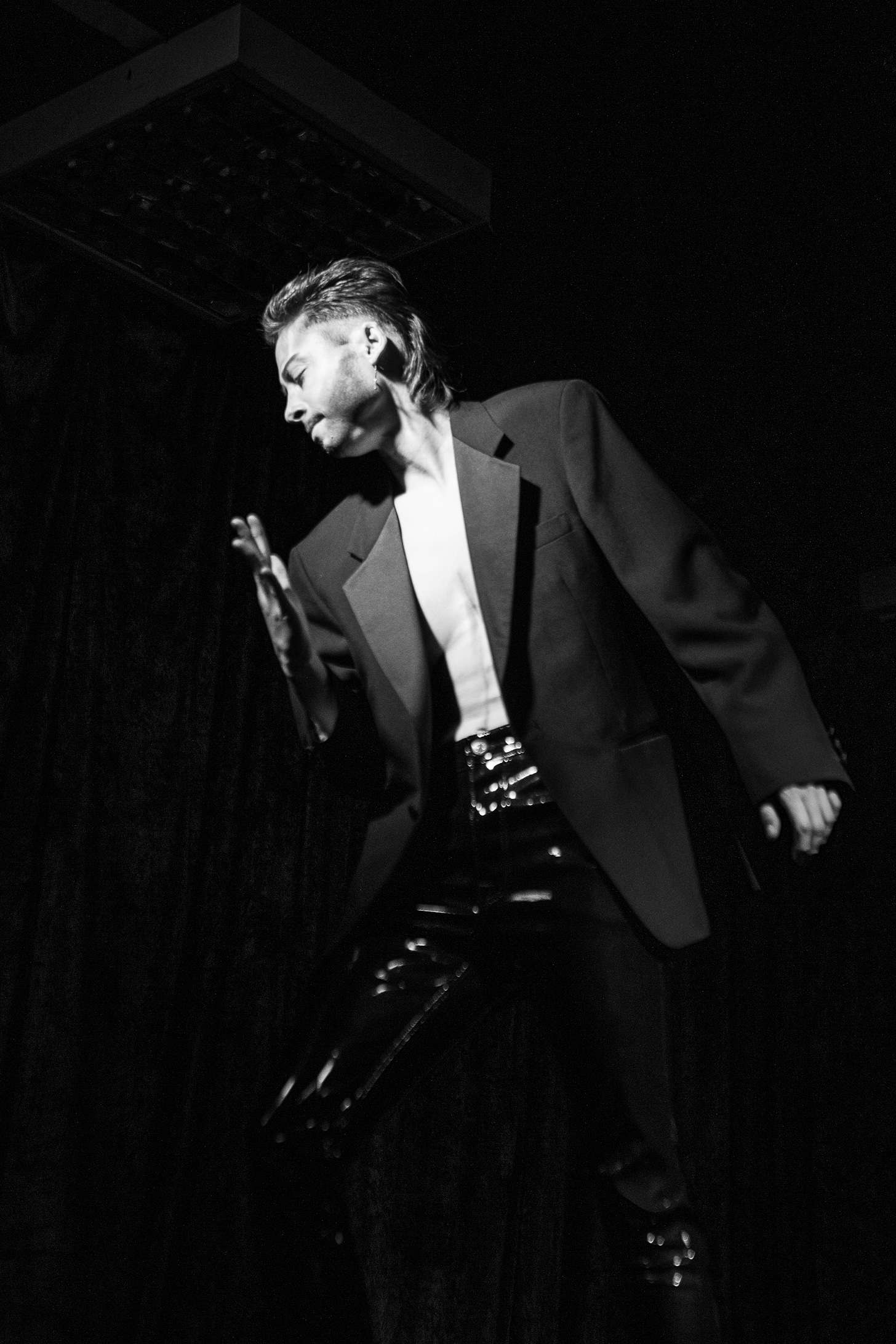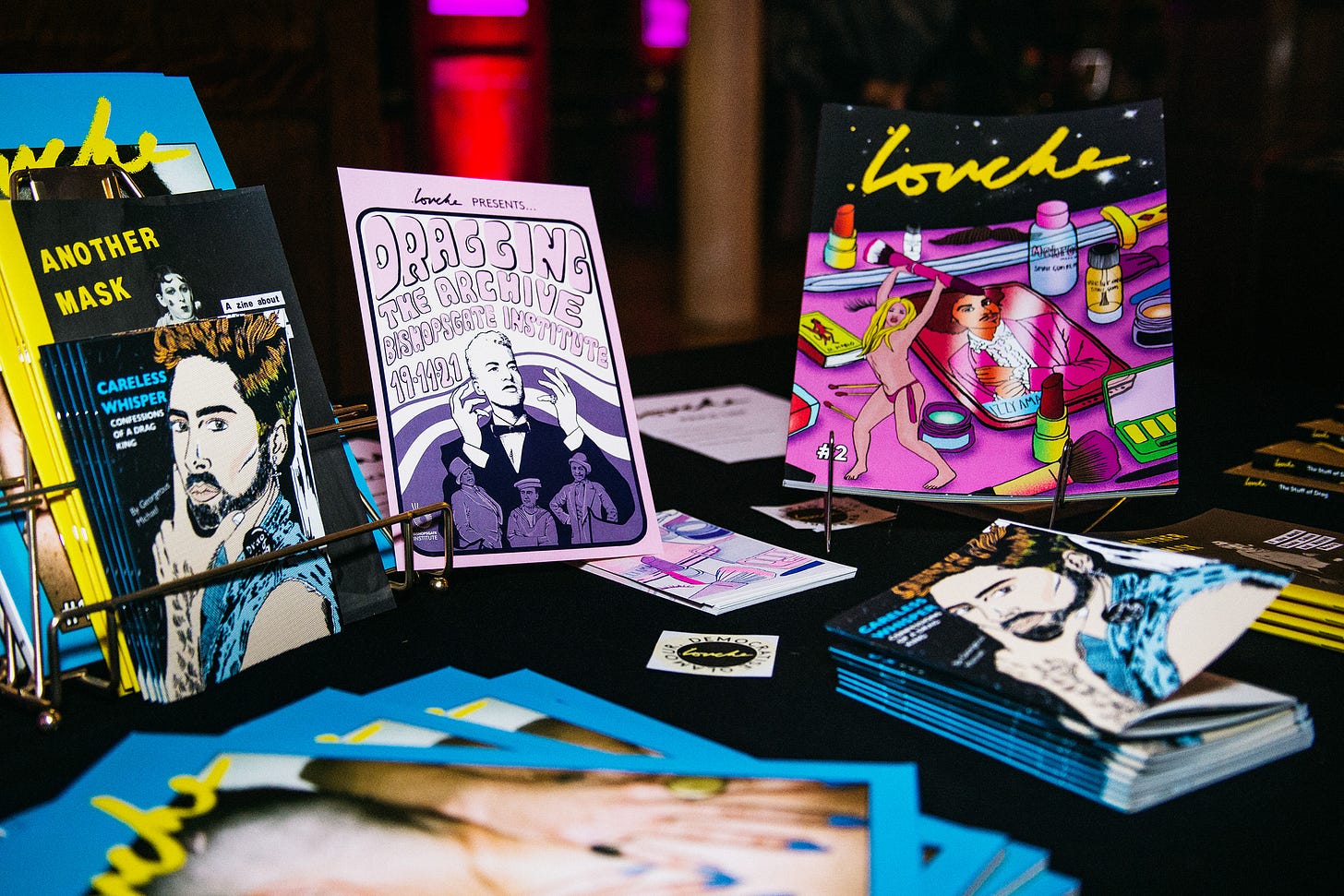How drag kings are battling misogyny through performance
Drag kings discuss blurring binary boundaries and battling with misogyny.
As the heats for the UK’s largest drag king competition Man Up kick off, drag king Georgeous Michael reflects on the misconception that the emergence of drag kings is only recent: unpacking the factors impacting their slow emergence, as they battle with lingering misogyny.
In simple terms, a drag king is defined as a person, especially a woman, who dresses as a man and performs as an entertainer in male drag - essentially, they are the counterparts to drag queens. however, for many kings, drag holds more meaning under the surface, as Georgeous Michael tells me, ‘drag is like a survival strategy’ in queer culture.
Stepping beyond the boundaries of a tribute act, Georgeous Michael taps deeper into George Michael’s character, as they dissect gender and sexuality through performance. They said that they, ‘like being a dyke impersonating a man who was trying to give the impression that he was a straight who was actually a gay man. I like that those layers, especially during the early George era kind of stuff.’
Drag artist Georgeous Michael first made an appearance, at drag king competition Man Up, which sticks two fingers up at misogyny, providing a safe space for drag kings to freely express themselves. At the time Georgeous Michael said that the show was fairly small and so ‘the stakes felt quite low’.
Since then, Man Up has expanded to become the UK’s largest drag king competition, hosted annually at LGBTQ+ performance venue and pub, the Glory.
This year’s host, and fellow Drag King, Don One says that ‘drag provides a platform for all people regardless of race, gender and sexuality to present a side of themselves that they want to be celebrated.’
Don One has utilised drag as a vessel to celebrate characteristics which had previously been used as a point of mockery, they stated that they knew their drag transformation would be easy because ‘as a tall androgynous black woman with short hair, I get misgendered all the time.’
Stereotypical depictions of masculinity are not crucial to drag king performance, which Georgeous Michael is here to prove. By blurring the boundaries of binary, Georgeous Michael exhibits ‘quite a soft, gentle and joyful masculinity.’
Further to the nature of their performance, Georgeous Michael promotes drag ‘that’s across the whole spectrum and not necessarily super binearised’ this is because they ‘think that you can end up replicating and reinforcing some of the stereotypes around the gender binary inadvertently through doing drag.’ Through merging the division between kings and queens, Georgeous Michael also starts to level the playing field with drag, ensuring that equal opportunities will start to emerge for all drag artists.
Many drag kings are adapting their performances to extinguish underlying misogyny which has limited their opportunities. Don One tells me how the performances have evolved over the years to become ‘more political as lots of acts really go in on bringing down the patriarchy!’
Future Commercialisation
The impact of misogyny is particularly prevalent as we enter a so called ‘golden age of drag’, as kings are often excluded from this narrative. Don One is keen for drag kings to gain more exposure, yearning for the day a king takes the throne on RuPaul’s Drag Race. They said that ‘drag kings should become more commercialised. We deserve the same amount of exposure as drag queens’.
In comparison to queens, drag kings are underfunded, exposure of this light would provide them with a platform to perform their art for a living, rather than as a hobby.
However, the commercialisation of drag is concerning to some kings, including Georgeous Michael who wants kings to ‘have resources and clubs and nights and spaces’ however also recognises that entering the mainstream could lead to messages of importance being overlooked. They state that ‘drag is like a survival strategy in queer culture and it becomes commodified for straight entertainment and that feels a bit weird’.
Georgeous Michael raises worries about drag kings reaching the same level of success as drag queens, particularly potential future prospects to feature on popular shows such as RuPaul’s Drag Race, which in its most recent series, RuPaul’s Drag Race UK Versus The World, saw viewing figures reach 350,000 people.
Drag kings are driven by the spirit of exploring difference, which unites them as a community. Georgeous Michael refers to these venues as ‘a safe, or safer, space’.
Powdered Sugar, competitor in this year’s Man Up, captured this feeling stating that ‘I had never clicked with a room of people like I did with the other kings, during my first heat at Man Up’. They stated that ‘it didn’t feel like we were competing, we were all there to appreciate our art’. Stepping into the sphere of popular culture may water down kings’ content as they perform for an audience less knowledgeable about queer culture.
Alternative exploration of drag
To combat the threat of commercialisation, Georgeous Michael explores the alternative side of drag, by producing indie magazine Louche. The indie was born before RuPaul voyaged to the UK, Louche was born while all drag remained underground.
Playing on the rebellion of early drag, the second edition of the DIY magazine was released at the end of last year, which covers the material nature of drag; the objects, the things, the ephemera, that serve to create drag magic.
This passion project, is pulled together by unpaid contributors, demonstrating the significance of drag to the lives of these individuals.
Attempting to get arts council funding for the next edition of Louche, in this apocalyptic (hopefully) post-covid society will no doubt prove a challenge for Georgeous Michael, but definitely a battle worth having to continue celebrating the joys of drag, for a community that understands it.
Join the contestants for the last heat of Man Up on 20th April at the Glory Pub, London.






